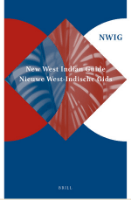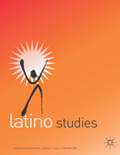
NWIG-New West Indian Guide-Nieuwe West-Indische Gids
Scope & Guideline
Advancing Scholarship on Caribbean Histories and Cultures.
Introduction
Aims and Scopes
- Caribbean Histories and Cultures:
The journal delves into the historical narratives and cultural expressions within the Caribbean, examining how colonial legacies, migration, and cultural exchanges shape contemporary identities. - Race and Identity Studies:
A significant focus is placed on race, ethnicity, and identity, particularly in the context of the African diaspora, exploring themes such as anti-colonialism, racial dynamics, and intersectionality. - Literature and the Arts:
NWIG emphasizes literary analysis and artistic expressions, investigating how literature, music, and visual arts reflect and challenge societal norms and historical realities in the Caribbean. - Environmental and Social Justice:
The journal addresses environmental issues and social justice movements in the Caribbean, highlighting the intersection of ecology, politics, and community activism. - Transnational and Diasporic Perspectives:
It promotes research that examines Caribbean diasporas and transnational connections, exploring how Caribbean identities are constructed and represented in global contexts.
Trending and Emerging
- Gender and Feminist Studies:
There is an increasing emphasis on gender studies and feminist perspectives, particularly regarding women's roles in resistance movements, cultural production, and societal change in the Caribbean. - Environmental Justice and Sustainability:
Emerging discourse around environmental justice highlights the Caribbean's vulnerabilities to climate change and the importance of sustainable practices, reflecting a growing academic interest in ecological issues. - Decolonization and Postcolonial Critique:
The journal is witnessing a rise in studies addressing decolonization processes and postcolonial critiques, focusing on how these frameworks inform contemporary Caribbean identities and social movements. - Migration and Mobility:
Research on migration patterns, both within the Caribbean and in relation to global diasporas, is becoming more prominent, reflecting the complexities of identity, belonging, and cultural exchange. - Cultural Memory and Historical Trauma:
There is a notable trend in exploring cultural memory and the legacies of historical trauma, particularly related to slavery, colonialism, and resistance, as scholars seek to understand their implications for contemporary Caribbean societies.
Declining or Waning
- Traditional Colonial Histories:
There has been a noticeable decrease in papers solely focused on traditional colonial histories, as scholars increasingly seek to engage with more contemporary and intersectional analyses of colonial impact. - Purely Economic Analyses:
Research concentrating exclusively on economic aspects of Caribbean societies appears to be waning, with a shift towards more holistic approaches that integrate cultural, social, and political dimensions. - Narrowly Defined National Studies:
Studies that focus solely on national narratives without considering transnational influences or diasporic perspectives seem to be less prevalent, indicating a broader interest in interconnected Caribbean experiences.
Similar Journals

Cuadernos de Literatura del Caribe e Hispanoamerica
Exploring the Rich Tapestry of Caribbean and Hispanic LiteratureCuadernos de Literatura del Caribe e Hispanoamerica is a prestigious academic journal published by UNIV ATLANTICO, FAC CIENCIAS HUMANAS, dedicated to advancing scholarly discourse in the field of Caribbean and Hispanic literature. With a focus on the rich cultural narratives and literary expressions that emerge from this vibrant region, the journal aims to serve as a vital resource for researchers, professionals, and students alike. It primarily publishes original research articles, critical essays, and book reviews, contributing to the understanding of the diverse literary landscapes of the Caribbean and Hispanic world. Although it currently does not offer Open Access, the journal's commitment to quality scholarship is reflected in its comprehensive editorial standards and rigorous peer-review process. Positioned within a global context, it serves as an invaluable platform for interdisciplinary dialogue and research dissemination, fostering a deeper appreciation of the literary heritage and contemporary issues faced by these communities.

Caravelle
Empowering Voices in Arts and Humanities ResearchCaravelle, an esteemed journal published by PRESSES UNIV MIDI-PUM, serves as a vital platform for scholarly discourse within the fields of Arts and Humanities, specifically focusing on Cultural Studies. Established in 1999 and embracing open access since 2012, this French journal has made significant strides in ensuring that its research is readily available to a global audience, fostering inquiry and innovation among researchers, professionals, and students. With a current impact factor placing it in the Q3 quartile across its core disciplines, Caravelle has positioned itself as an essential resource within the academic community, offering insights that are both relevant and transformative. The journal's commitment to quality and engagement with contemporary cultural issues is reflected in its diverse range of articles, making it an attractive avenue for those seeking to enhance their understanding and contribute to discussions surrounding cultural phenomena.

Latino Studies
Driving Innovative Research in Latino Cultural DiscourseLatino Studies is a distinguished peer-reviewed journal published by Palgrave Macmillan Ltd, dedicated to advancing the interdisciplinary understanding of Latino cultures, histories, and societal contributions. With an ISSN of 1476-3435 and an E-ISSN of 1476-3443, this journal serves as a vital resource for researchers, professionals, and students engaged in Cultural Studies, History, Sociology, and Political Science. Recognized for its impactful scholarship, it holds a notable position in the 2023 journal rankings, landing in Q2 for Cultural Studies and History, and Q3 for Sociology and Political Science. The journal is committed to fostering insightful dialogue and reflection around the complex narratives of Latino communities, making it an essential forum for scholarly discourse. As it converges its scope from 2009 to 2024, Latino Studies continues to evolve alongside contemporary issues, encouraging innovative research that bridges gaps in the current academic landscape.

INTERNATIONAL JOURNAL OF AFRICAN HISTORICAL STUDIES
Engaging with Africa's Past to Inform the PresentInternational Journal of African Historical Studies is a leading academic journal published by the African Studies Center at Boston University. With its ISSN 0361-7882 and E-ISSN 2326-3016, this journal serves as a vital platform for scholarly discourse in the fields of History, Cultural Studies, and Sociology. Renowned for its rigorous peer-reviewed research, the journal holds a commendable Q1 ranking in History and Q2 in Cultural Studies as of 2023, highlighting its influence and contribution to African historical scholarship. The journal has been published since 1976, consistently providing insightful analyses and critical research that engage with Africa's past and present, thereby enriching our understanding of global histories. Although it does not offer an open-access model, the journal is accessible through various academic databases and institutions. Its mission is to foster a deeper understanding of African histories by publishing high-quality, innovative research that reflects diverse perspectives, making it an essential resource for researchers, professionals, and students dedicated to the study of African history and cultural dynamics.

African Diaspora
Charting New Territories in Cultural and Historical ResearchAfrican Diaspora is a prominent academic journal published by BRILL that serves as a critical platform for interdisciplinary research in the fields of Cultural Studies, History, Linguistics, and Sociology. With its ISSN 1872-5457 and E-ISSN 1872-5465, the journal has established itself as a vital resource for scholars seeking to explore the complexities of African diaspora experiences and their manifold expressions across global contexts. Situated in the Netherlands, (Address: Plantijnstraat 2, P.O. Box 9000, 2300 PA Leiden), the journal operates within notable quartiles such as Q2 in Cultural Studies and History, which highlights its impact in academic circles. The journal is indexed in Scopus with impressive rankings, including an 88th percentile position in History, emphasizing its broad reach and rigorous scholarly standards. Researchers and graduate students alike are encouraged to contribute to this esteemed journal, which not only enriches academic discourse but also promotes a deeper understanding of the historical and contemporary implications of the African diaspora narrative.

Small Axe
Navigating the Complexities of Contemporary CultureSmall Axe is a distinguished academic journal published by DUKE UNIVERSITY PRESS, focusing on the intersections of Cultural Studies, Literature and Literary Theory, and Sociology and Political Science. With an ISSN of 0799-0537 and an E-ISSN of 1534-6714, this journal has garnered significant recognition in its field, achieving a Q1 ranking in Literature and Literary Theory and a Q2 in Cultural Studies as of 2023. Its commitment to fostering scholarly dialogue on critical issues stretches through converged years from 2018 to 2024, ensuring timely and relevant contributions to the discourse. Although not an Open Access journal, it provides valuable insights and research that are pivotal for academia, driving forward conversations on social justice, identity politics, and the dynamic nature of culture. With strong Scopus ranks that affirm its impact—placing it in the 89th percentile for Literature and Literary Theory and the 65th percentile for Cultural Studies—Small Axe is instrumental for researchers, professionals, and students who are invested in the nuanced exploration of contemporary societal issues.

LATIN AMERICAN RESEARCH REVIEW
Empowering scholars with open access to vital research.LATIN AMERICAN RESEARCH REVIEW, published by Cambridge University Press, is a premier open-access journal dedicated to advancing scholarship in the field of Latin American studies. Established in 1970, the journal has consistently evolved to address critical interdisciplinary issues, encompassing a broad spectrum of topics from anthropology and cultural studies to economics and political science. With its strong impact reflected in 2023's quartile rankings, including Q1 in both Cultural Studies and History, LATIN AMERICAN RESEARCH REVIEW ranks among the top-tier journals in multiple disciplines, capturing the interest of scholars worldwide. This journal not only fosters a deeper understanding of Latin America's diverse cultures, histories, and socioeconomic landscapes but also serves as a vital platform for innovative research and discussions. By offering open access since 2017, it ensures that its valuable contributions are widely disseminated, making it an indispensable resource for researchers, professionals, and students alike who are looking to engage with contemporary Latin American issues.

MEXICAN STUDIES-ESTUDIOS MEXICANOS
Fostering Insight into Latin America's Cultural LandscapeMEXICAN STUDIES-ESTUDIOS MEXICANOS, published by University of California Press, is a distinguished journal that explores critical issues in the fields of cultural studies and history, with a keen focus on Mexican and Latin American contexts. Established in 1985, this journal serves as an invaluable platform for researchers, professionals, and students alike, aiming to deepen understanding of Mexico's complex social, cultural, and historical landscapes. With an impressive placement in the Q2 category in both Cultural Studies and History, it ranks within the top tiers of scholarly discourse, demonstrating a strong impact factor that reflects its significance in the academic community. Although it does not currently offer Open Access, the journal remains committed to delivering high-quality, peer-reviewed research that stimulates ongoing debates and enriches scholarship in the humanities and social sciences. Nestled at the heart of scholarly conversations, MEXICAN STUDIES-ESTUDIOS MEXICANOS continues to play a pivotal role in advancing academic inquiry into Mexico's past and present.

Journal of New Zealand Studies
Exploring the Rich Tapestry of New Zealand's IdentityJournal of New Zealand Studies, published by Victoria University of Wellington, Faculty of Law, serves as a pivotal platform for exploration and scholarship pertaining to the cultural, social, and historical dimensions of New Zealand. With its ISSN 1176-306X and E-ISSN 2324-3740, this journal emphasizes interdisciplinary research and aims to promote dialogue between various disciplines within the arts and humanities and social sciences. Despite being categorized in the Q4 quartile for both fields, it represents a unique opportunity for researchers and academics to contribute to, and engage with, the evolving narrative of New Zealand’s identity and its global context. This periodical is crucial for those seeking to delve deeper into the local issues, cultural phenomena, and societal changes that shape New Zealand. It welcomes contributions that push the boundaries of conventional research, thereby enhancing scholarly discourse. For researchers, professionals, and students alike, Journal of New Zealand Studies offers a rich resource for advancing knowledge and fostering an appreciation for New Zealand's diverse scholarly landscape.

REVIEW-LITERATURE AND ARTS OF THE AMERICAS
Illuminating Artistic Expressions Through Scholarly Insight.REVIEW-LITERATURE AND ARTS OF THE AMERICAS, published by Routledge Journals, Taylor & Francis Ltd, serves as a vital platform for the exploration of literary and artistic expressions across the Americas. With an ISSN of 0890-5762 and an E-ISSN of 1743-0666, this journal has been dedicated to fostering scholarly discussion since its inception in 1968, addressing interdisciplinary themes that span literature, visual arts, and performing arts. Despite its current Q4 rankings in both Literature and Literary Theory as well as Visual Arts and Performing Arts, the journal remains committed to elevating critical discourse and offering a nurturing environment for emerging voices in the field. Access to the journal is through subscription, highlighting its focused audience of researchers, professionals, and students who seek to deepen their understanding of the cultural dynamics of the Americas. By engaging with diverse scholarly perspectives, REVIEW-LITERATURE AND ARTS OF THE AMERICAS aims to contribute to the ongoing dialogue about the significance of art and literature in societal contexts, making it an important resource for anyone interested in this rich and vibrant area of study.